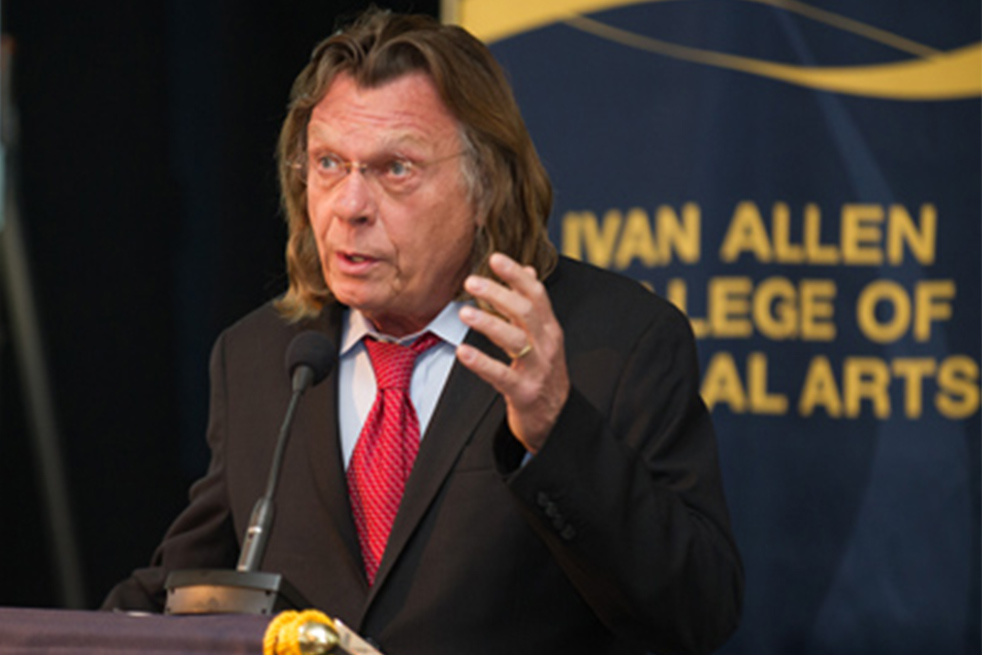Although ensconced in a corner of the Skiles courtyard and tucked into a brick wall, the small glass foyer on which bold yellow letters that read “Poetry at Tech” are painted is clearly visible from the walkway. Despite its distinct and rather peculiar physical presence on Tech’s campus, many students are unaware of what Poetry at Tech truly has to offer.
“[The mission] of Poetry at Tech is to bring poetry to as wide an audience as possible, to recognize poetry for its possibilities in all our lives and to recognize those involved in the craft of writing poetry — poets as well as spoken word performers, whether accomplished, rising or beginning — for the artists they are,” Thomas Lux, a Tech professor and the Director of Poetry at Tech, said.
Poetry is also a way for individuals to connect with the outside world — a connection that is easily lost in the infamous “Tech-bubble.” Moreover, Tech students can easily become focused on only the tangible aspects of the world.
“I think poetry adds human experience. If you are focused on things that can be measured, sometimes what can be lost is that which cannot be measured, like our emotions, the way we experience the world. It’s something that can be only described through metaphor or through words or through images that poets provide us with,” said Professor Mirja Lobnik, who teaches English 1102. “Poetry at Tech is so valuable because it brings back poetry, words and language as a breathing, living, artistic material.”
Poetry at Tech was established sixteen years ago with two large endowments from Henry Bourne and Bruce McEver, who both believed that Tech lacked the richness of a cultured and well-rounded education. Bourne was an EE professor, the Provost and even the President of Tech. McEver graduated from Tech in the 1960s with an IE degree and went on to write critically acclaimed poetry after attending the Harvard Business and Harvard Divinity School.
In the spring of 2001, Thomas Lux was offered Bourne’s position at the university, and he decided to create a program to best honor the funds of Bruce McEver and Henry Bourne. Thomas Lux also earned his BA in 1970 from Emerson College, and he started to teach and write early; he even published his first book at the young age of twenty-five.
“I don’t have any advanced degrees. I’m the only Georgia Tech faculty without a Ph.D. I don’t even have a computer in my office,” Lux said. “But I’m here because I’m a poet. I really love being here, and it was an opportunity to build this program of readings and outreach as well as teach here at Tech. That was fun and a challenge, and it’s been quite successful at Poetry at Tech.”
Poetry at Tech offers various opportunities for both students and the community of Atlanta who are eager to get involved with poetry. Moreover, there are several classes, workshops, extensive poetry reading series and major community outreach programs to appeal to interested poetry
students.
“For anybody, the best way to get involved is to start going to the readings. We have about five a year and there are at least two poets at every reading,” Dr. Jennifer Holley Lux, a former Brittain Postdoctoral fellow and Poetry at Tech worker, said. “It’s a very diverse series: we have spoken word artists, more traditional and formal poets, people whose work is mostly known on the page, people whose work is known on the stage — a lot of different people.”
Some of the poets who have visited and spoken at Tech include renowned former U.S. poet laureate Billy Collins and Richard Blanco, a poet and CE major who read at President Obama’s second inauguration.
Poetry at Tech has hosted over one hundred and forty poets from around the world, making its poetry reading series a nationally known program. As if the famous poets are not enough, Poetry at Tech also offers classes and workshops to help students interested in developing their respective
poetry skills.
“There are three different classes available to undergraduates. If someone is interested in poetry, they’d probably take my reading class first, where we read a wide range of poetry,” Thomas Lux said. “And then if they were still interested and wanted to write some poetry, they’d probably take Travis [Denton’s] creative writing class, which includes reading and writing poetry. And if they were still interested, they would take my small poetry writing workshop, which is only seven people.”
Poetry at Tech also offers five day-long community workshops throughout the year. The classes are five to six hours on a Saturday and include intensive critiques of work-in-progress poems.
“These are very in-depth classes; you have to have good poetry stamina, because they’re about five to six hours long,” Dr. Jennifer Lux said. “You have to be in it for the long haul, but you can get feedback and serious critique on your poems.”
Although the classes seem long, the results are certainly worth the time for future student poets.
